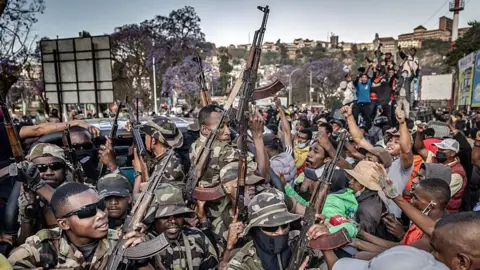The island nation of Madagascar teeters on the edge of political upheaval as a military unit known as CAPSAT declared it has seized control of the armed forces, challenging President Andry Rajoelina’s grip on power.
Like a gathering storm that finally breaks, this crisis has been building since September. What began as youth protests over basic utilities – water and power outages that left citizens in the dark – has swelled into something far more significant. The demonstrations now echo deeper grievances: widespread unemployment, allegations of corruption, and the crushing weight of rising living costs.
In a development that brings to mind the old saying about history rhyming if not repeating, CAPSAT – the same military unit that helped usher Rajoelina into power during the 2009 crisis – now appears to be turning against him. They’ve appointed General Demosthene Pikulas as the new army chief of staff, a move that’s gained unexpected support from within the government itself.
President Rajoelina, fighting to maintain control, denounced what he called “an attempt to seize power” that violates constitutional principles. His office issued a call for unity among national forces to defend constitutional order – but that call may be falling on deaf ears.
The streets of Antananarivo, Madagascar’s capital, tell their own story. For the second straight day, protesters have gathered at May 13 Square – a symbolic location that has witnessed previous political upheavals. This breakthrough to the square, which demonstrators had previously failed to reach, marks a significant shift in the momentum of these protests.
Adding fuel to this political fire, CAPSAT troops left their barracks Saturday to join the demonstrators, condemning the use of force against protesters by other security units. Reports of gunfire at a CAPSAT camp on Sunday suggest the situation continues to deteriorate.
What we’re witnessing in Madagascar bears the hallmarks of past political crises in developing nations: a perfect storm of economic hardship, political dissatisfaction, and military intervention. The armed forces minister’s reported blessing of the new military leadership suggests cracks in the government’s foundation are widening.
As this situation unfolds, one thing becomes clear: the demonstrators who’ve “conquered” May 13 Square – as one protester put it – show no signs of backing down until their demands are met. Their determination, coupled with military support, presents President Rajoelina with perhaps the greatest challenge to his leadership since he first came to power.
For now, Madagascar stands at a crossroads, with its immediate future hanging in the balance. As we’ve seen time and again across the globe, when people’s basic needs go unmet and their voices unheard, change becomes not just possible, but inevitable.


